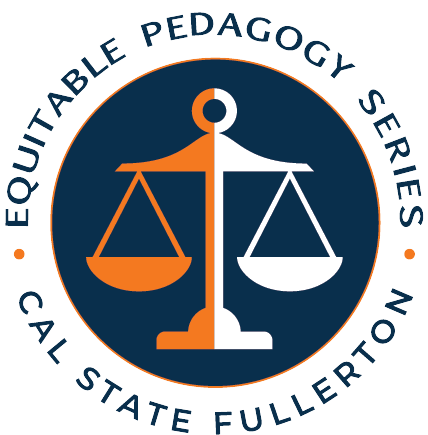Equitable Pedagogy Series
The Equitable Pedagogy (EP) Series helps faculty know more about who our students are and what evidence-based instructional practices have proven most effective at facilitating learning for students from diverse backgrounds and with varying degrees of preparation.
Student-Centered Teaching Module (formerly EPM1)
After completing this module, you will be able to:
- explain opportunity gaps in education and root causes
- articulate the importance of equity-minded instruction in supporting the success of students from diverse backgrounds
- identify specific strategies you can implement in your teaching that support learning for students from diverse backgrounds.
Faculty interested in exploring this module can enroll using the Student-Centered Teaching Module self-enroll link.
Anti-Racist Teaching Module (formerly EPM2a and EPM2b)
After completing these modules, you will be able to:
- explain intersecting axes of privilege, domination, and oppression, and explore racial oppression scenarios
- articulate anti-racist pedagogy central tenents you can use to engage in anti-racist teaching practices with students authentically
- identify strategies you can utilize to navigate through the emotional complexities of anti-racism in the classroom
- explain the relationship between power and communication interactions to use language effectively in intercultural encounters in the classroom
- perform a syllabus audit using anti-racist and equity-centered practices
Faculty interested in exploring this module can enroll using the Anti-Racist Teaching Module self-enroll link.
Emphasizing Linguistic Inclusion (
Equitable Pedagogy Module 3)
After completing this module, you will be able to:
- Explore our own personal linguistic repertoires, named languages, and language varieties
- Reflect on our own attitudes toward other people’s language use, including our biases and stereotypes
- Get to know the linguistic repertoires of faculty, staff, and students at Cal State Fullerton; reflect on whether these language practices are used in university spaces
- Understand the research on the linguistic potential of different languages and varieties
- Define linguistic privilege and linguistic oppression, and understand how language intersects with other oppressions
- Reflect on the role of the
‘White Gaze’
in linguistic interaction
- Brainstorm how you can become a model of linguistic inclusivity through intentional reflection on language choices
Workshops Marked with EP Series Symbol
On all FDC correspondence, including the FDC Newsletter, workshops marked with a EP Series symbol enhance understanding of equitable pedagogy.
Eligibility
EP workshops, activities, and resources are open and available to all who are interested in applying and/or participating, regardless of race, sex, color, ethnicity, national origin, or any other protected status.
